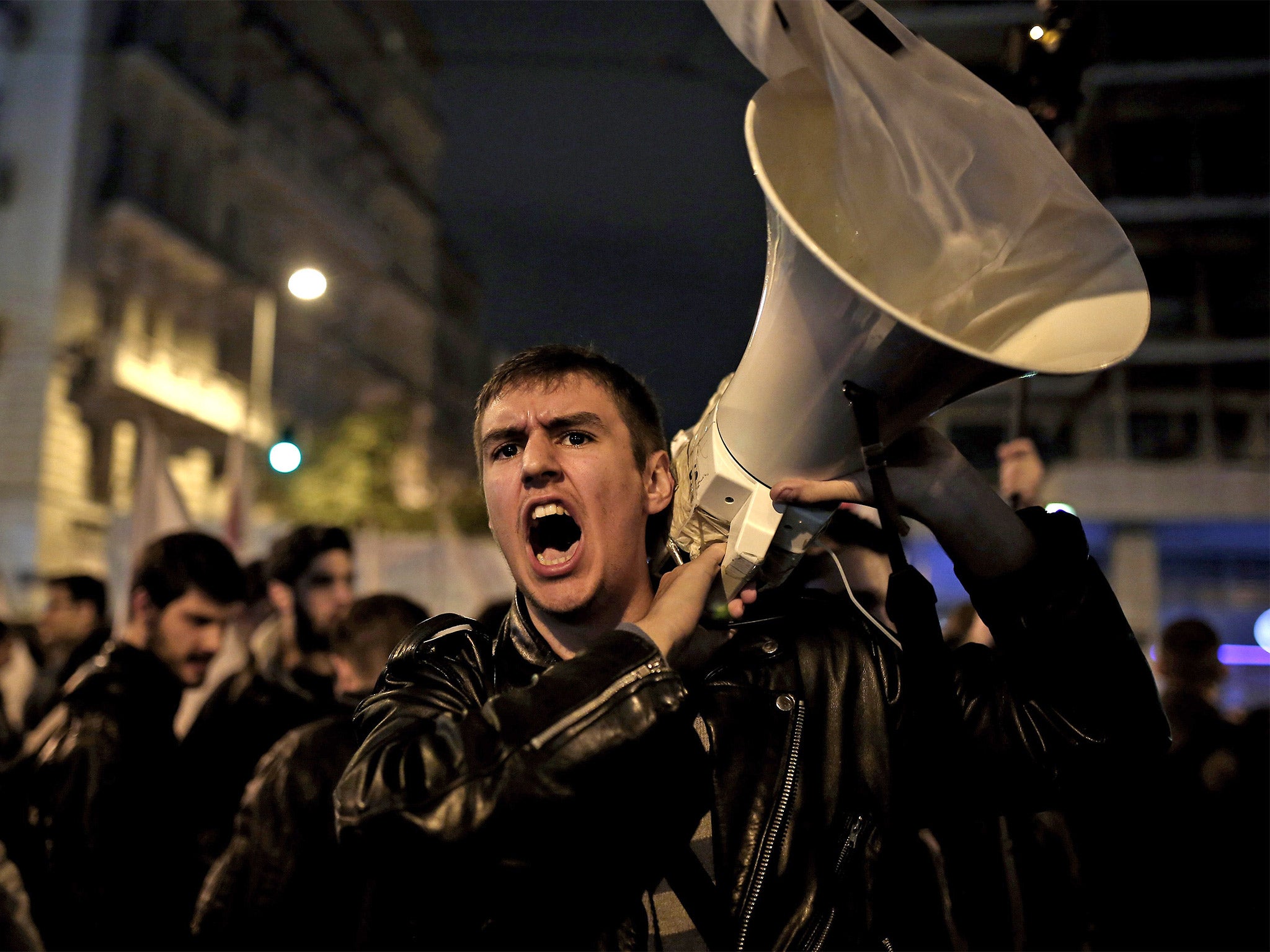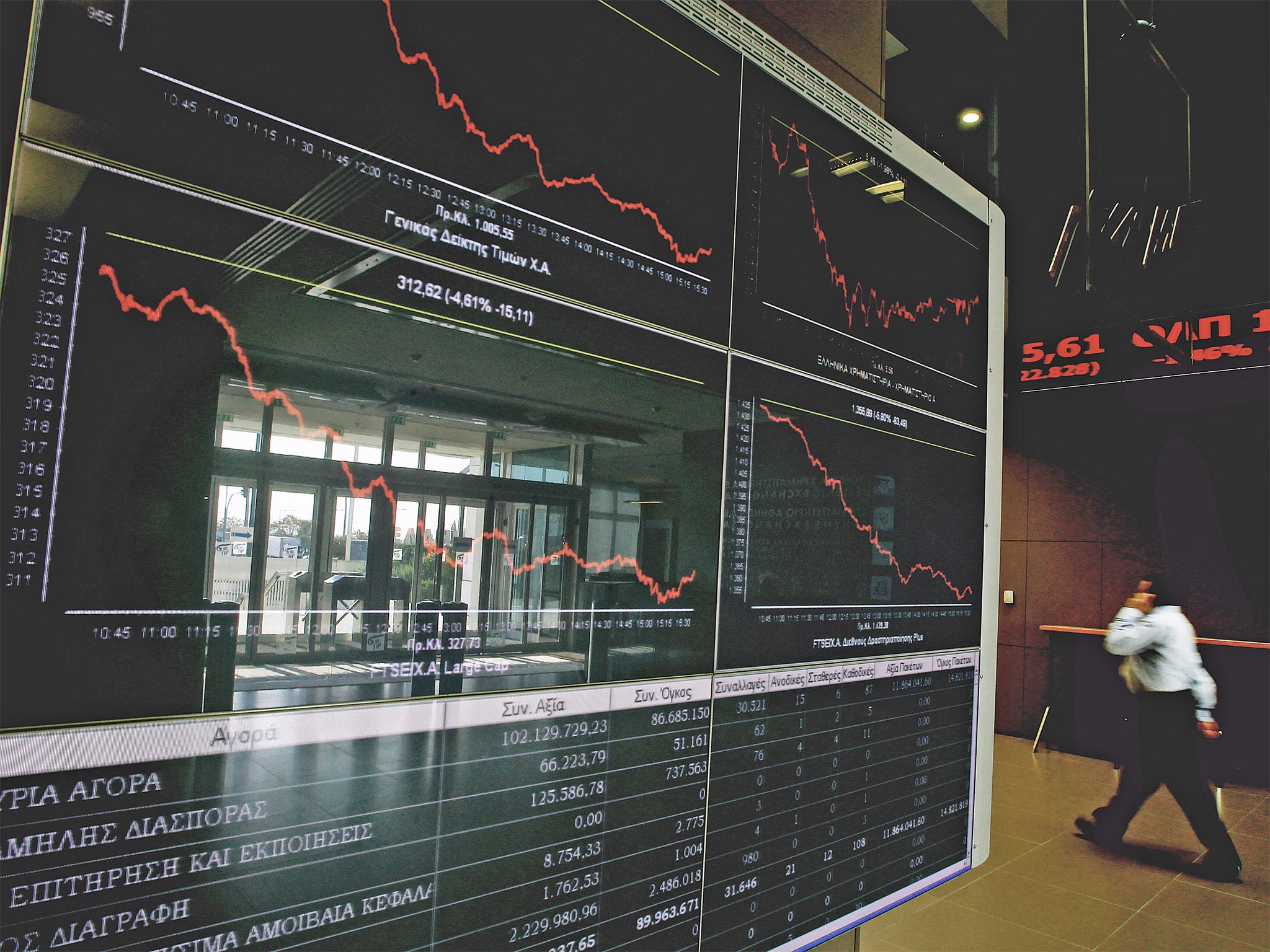Black Tuesday in Greece as markets plummet amid election fears
Shares plummet and confidence is shattered after Greek PM calls a snap presidential election that could lead to the radical Syriza party taking power

Your support helps us to tell the story
From reproductive rights to climate change to Big Tech, The Independent is on the ground when the story is developing. Whether it's investigating the financials of Elon Musk's pro-Trump PAC or producing our latest documentary, 'The A Word', which shines a light on the American women fighting for reproductive rights, we know how important it is to parse out the facts from the messaging.
At such a critical moment in US history, we need reporters on the ground. Your donation allows us to keep sending journalists to speak to both sides of the story.
The Independent is trusted by Americans across the entire political spectrum. And unlike many other quality news outlets, we choose not to lock Americans out of our reporting and analysis with paywalls. We believe quality journalism should be available to everyone, paid for by those who can afford it.
Your support makes all the difference.Greek financial markets plummeted on Tuesday as investors took fright at the premier's decision to hold a no-confidence vote in his administration fuelling fresh political instability and fears of the radical Syriza party taking power.
The Athens share index fell by almost 13 per cent, the biggest single-day drop since 1987 and a heftier decline than any registered in the recent years of financial crisis in the Mediterranean country. Yesterday has already been named “Black Tuesday”.
The panic followed the surprise decision taken on Monday by the Prime Minister, Antonis Samaras, to call a snap presidential election. Analysts said an early presidential poll increased the likelihood of a snap general election, which could take place as early as next month.
Syriza, which opposes the terms of the country’s €245bn rescue by the European Union and the International Monetary Fund, is currently ahead in the polls, with around 30 per cent of the vote share.
The decision to call elections was unexpected and political analysts say the vote will be widely viewed as a confidence vote in the current administration. The poll, which was originally planned for February next year, has been brought forward to 17 December. The government has accused Syriza of stoking political instability.
“While we had stabilised ourselves financially and embarked on a period of recovery, clouds of instability were forming inside Greece,” Mr Samaras said yesterday.
He said he had called the elections “to remove uncertainty and reinstate political stability.
“With the presidential election from the Greek parliament the clouds will have cleared up and our country will be officially ready to embark in the post-bailout era,” Mr Samaras said in a statement.
Charles Robertson, of Renaissance Capital, warned that Greek elections could reopen the eurozone’s currency crisis. “A possible Syriza election victory may force the eurozone to choose between a fiscal union or the first euro exit” he said.

The bond market provided further evidence of the investors’ growing alarm, with the price of Greek 10-year debt falling steeply yesterday. That pushed up the country’s borrowing costs back above 8 per cent, well above the level considered by economists to be sustainable.
There had been signs of the Greek economy turning a corner recently. Official statistics released this month showed that GDP expanded for the first time in five years earlier this year.
However, output remains 30 per cent below where it was in 2009 and a quarter of the workforce is still unemployed. The country’s national debt currently stands at €320bn, equal to 175 per cent of GDP, the highest burden in the eurozone.
Mr Samaras yesterday nominated Stavros Dimas, a former EU commissioner, for the largely ceremonial post of president. Voting will begin next week.
The next Greek general election had not been due to take place until 2016. Mr Samaras’s New Democracy Party narrowly defeated Syriza in the June 2012 elections, the last time many feared Greece was on the verge of crashing out of the single currency.
The continuing austerity demands from Mr Samaras’s government have stoked further popular resentment.
Earlier this week eurozone finance ministers agreed to grant Athens a two-month “technical extension” to its bailout in return for further austerity measures, including a hike in VAT and further cuts in pensions.
“It’s the correct decision for the country,” said the political analyst George Tzogopoulos. “By speeding up the process, [the decision] gives an end to a long pre-election period... a climate of political instability.”
Syriza leads opinion polls, with the most recent showing a 5 per cent lead over its rival parties. Its leader, Alexis Tsipras, has long argued that he will renegotiate the bailout package and put an end to austerity while he promises to increase the incomes of Greeks.
In a statement released yesterday, the rating agency Fitch predicted that Greece is likely to have early general elections in the first three months of 2015, hinting that the next administration would be “less supportive of economic and fiscal reforms”.
Under Greece’s constitution, to become the country’s president, a candidate needs to be elected by at least 180 members of the 300-seat parliament.
The conservative-led administration currently has a 155 majority in parliament –but that still leaves them 25 parliamentary seats short of the majority needed.
A failure to install a presidential candidate after three attempts would force parliament to dissolve. All five opposition parties have said they would not support the presidential candidate so the stance of the 24 independent MPs will be crucially important.
On Monday evening, the EU agreed to extend Greece’s bailout programme, which was meant to end in December, by another two months, paving the way for the return of the inspectors to Athens and the resumption of a stalled review.
A few days ago, the Greek parliament voted in the country’s first balanced budget since the crisis and the country was praised for recording a primary surplus, the second highest in the eurozone after Germany.
Join our commenting forum
Join thought-provoking conversations, follow other Independent readers and see their replies
Comments